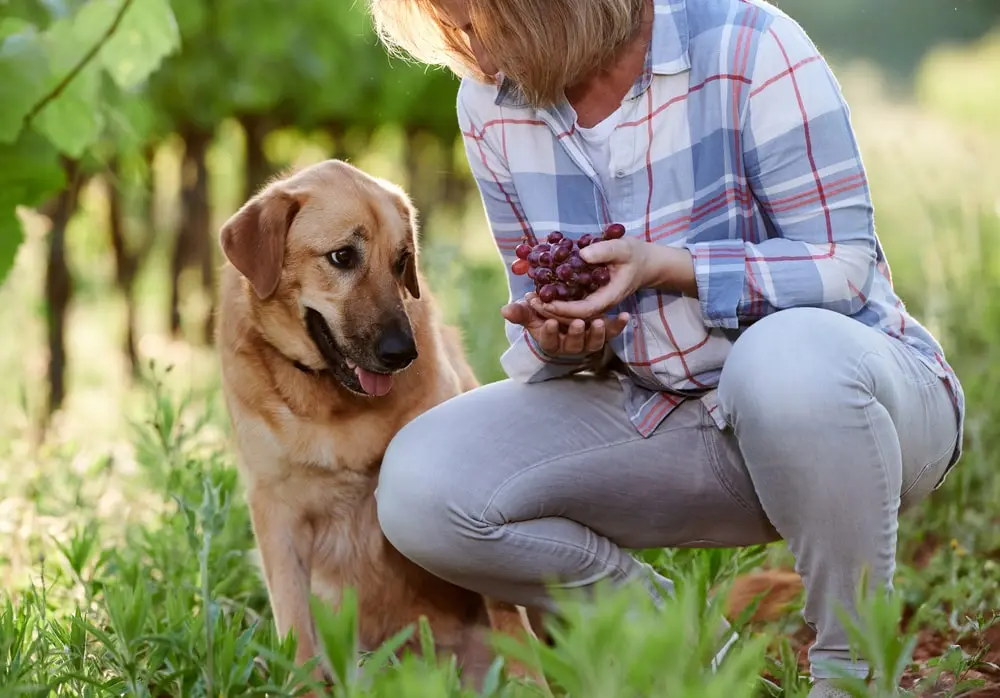PET HEALTH
Grapes are a wonderful fruit for humans, but dogs should not eat grapes. In fact, grapes are so toxic they’re considered one of the most dangerous household items for your dog.
If your dog does eat a grape, it’s important to know why they’re so dangerous and how to deal with the situation right away.
Why Are Grapes Toxic for Dogs?
The exact reason why grapes are toxic for dogs has been an ongoing mystery for veterinarians, with substances like mycotoxin (a toxic substance produced by a fungus or mold) or a salicylate (aspirin-like) serving as possible candidates.1
However, recent research by the American Society for the Prevention of Cruelty to Animals suggests that the tartaric acid found within grapes is the culprit. Tartaric acid is a nephrotoxin, which means it attacks the kidneys and can cause kidney failure. Without functioning kidneys, the body can’t process and remove the waste products that normally exit as urine.2 This causes symptoms ranging from abdominal pain, issues with urination, and seizures.
Studies have shown that the percentage of tartaric acid in grapes can range from 0.35% – 2%, so it’s hard to know how toxic a particular grape will be for your dog. But even in small concentrations, it can make your dog very sick and could be fatal.2
My dog ate raisins, are they at risk?
Unfortunately, raisins, currants, sultanas, and other dried grape foods are also toxic for dogs. This also applies to liquids like grape juice and wine as well as raisin bread, granola, and other foods that may contain raisins.3
While grapes are not safe for dogs, there are plenty of foods dogs can eat, including fruits that are safe for dogs like apples, bananas, and pears.
What Can I Do if My Dog Ate Grapes?
The biggest risk for dogs that eat grapes is kidney failure, so the goal of most treatment options is to prevent the toxins from reaching your dog’s kidneys.1
It’s highly recommended that you call your vet, a pet poison helpline, or an animal poison control service. They can provide you with the best course of action. In some cases, they may recommend you take the following actions.1
Induce vomiting
If your dog is still conscious and able to breathe, your vet or an expert on the pet poison helpline may recommend you induce vomiting. This is usually done by giving your dog a small amount of hydrogen peroxide. However, this is usually not recommended if your dog is having trouble breathing or is unable to move.4
Use activated charcoal
After inducing vomiting, your vet or an expert may also recommend administering activated charcoal, which helps prevent the absorption of the toxin in the stomach or intestines.5
Activated charcoal for dogs can be purchased through many pet retailers and drug stores without a prescription. It may also come in a large syringe so you can easily inject the charcoal into your dog’s throat, but this should only be done with the guidance of a vet or another medical professional.
What Can My Vet Do if My Dog Ate a Grape?
Depending on the severity of your dog’s grape poisoning, your vet might need to take steps to prevent kidney failure. Treatment options may include aggressive intravenous fluids and hospitalization for at least 24 – 48 hours to prevent dehydration and to help your dog maintain kidney function.1
Your vet may also need to prescribe medications in both the short and long term that can help control nausea or vomiting, maintain blood flow to the kidneys, and manage blood pressure.1
Will My Dog Recover After Eating a Grape?
Whether your dog recovers will be based on a number of factors including your dog’s size and age, how many grapes they ate relative to their size, and how quickly you and your vet were able to provide treatment.1
Unfortunately, the kidneys don’t regenerate or repair themselves very quickly, so they won’t function as well as they did before. If your dog receives the right care quickly, their chances of recovery should be good. However, if too much of the toxin damages their kidneys it may not be possible for them to recover their previous quality of life, and in some cases it may be fatal.1
How Can Pet Insurance Help?
If your dog does eat a grape, there could be a heavy cost to get the proper care. That’s why it may be worthwhile to get a dog insurance policy. A pet insurance policy could help cover approved expenses like hospitalization and treatment, bills, and medications.6
Also, if it's after hours and an emergency vet isn’t available, active policholders can use the MetLife Pet app to contact and get consultation from a licensed vet at any time. To learn more, get a free quote today.
Dr. Hunter Finn is an integrative veterinary expert first, and social media star second. America’s favorite veterinarian owns Pet Method in McKinney, Texas, where he cares for pets while prioritizing their emotional well-being. When he’s not at his clinic, he’s starring in viral videos on TikTok (2 million followers) and Instagram (500K followers) — where he’s been known to snuggle puppies and conquer the latest dance trends.
Want To Learn More?
MetLife Pet can help you cover pet emergency costs




